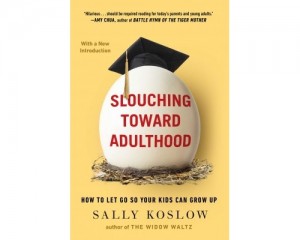 I recently received an interesting book for review, the softcover edition of Sally Koslow’s Slouching Toward Adulthood: How to Let Go So Your Kids Can Grow Up. Let me underscore up front that this is in no way a “Catholic” or even a religious book, although it does touch upon spiritual issues. Here’s the primary theme of the book:
I recently received an interesting book for review, the softcover edition of Sally Koslow’s Slouching Toward Adulthood: How to Let Go So Your Kids Can Grow Up. Let me underscore up front that this is in no way a “Catholic” or even a religious book, although it does touch upon spiritual issues. Here’s the primary theme of the book:
A witty and insightful report from the parenting trenches by the mother of two “adultescents”
Millions of American parents sit down to dinner every night, wondering why fully grown children are joining them—or, more likely, grunting good-bye as they head out for another night of who knows what. Sally Koslow, a journalist, novelist, and mother of two “adultescents” digs deep to reveal what lies behind the current generation’s unwillingness—or inability—to take flight.
By delving into the latest research and conducting probing interviews with both frustrated parents and their frustrated offspring, Koslow uses humor, insight, and honest self-reflection to give voice to the issues of prolonged dependency. From the adultescent’s relationship to work (or no work), money (that convenient parental ATM), or social life, Slouching Toward Adulthood is a provocative, razor-sharp, but heartfelt cri de coeur for all the parents who sent their kids to college only to have them ricochet home with a diploma in one hand and the DVR remote in the other.
I lapped up the first half of Koslow’s book on a recent plane trip and am anxious to finish it off, because I’m engaged in the thick of raising my own young adult sons. So far, the eldest shows no signs of being an “adultescent”, but his younger brother — the planned music major — holds a bit of potential for some of the traits Koslow describes in her book. He’s still home with us this summer before heading off to college in the Fall. I found myself reading this book and underlining many sections with him in mind, but also pondering families I know who have adult children living at home for a variety of reasons.
If you parent teens or young adult children, I encourage you to consider reading this book. Again, let me underscore that this is not a “Catholic” book in any way – you may find language or adult themes which you don’t condone. If those issues bother you, don’t read this book. But if you face fears or frustrations about your children’s “failure to launch”, I think you’ll find this book to have merit. Written with a familiarity that reminded me of good friends sitting down for coffee, Sally tells it like she sees it without pulling any punches. Sometimes that’s not pretty, but it’s always entertaining and this book provides terrific insight into a growing societal issue.
At the same time, I must say that I know so many fantastic young adults who fall into that 18-39 demographic. Indeed, far more than the ones who fit the “adultescent” bill. Those amazing folks — too numerous to list here — give me great confidence that the generations who follow mine are filled with far more gems than duds. They have already taught me so much about life, about faith, and about family. Hopefully their major accomplishments and all they do daily to make this world a better place will not go unnoticed. Maybe I need to write a book about them…



